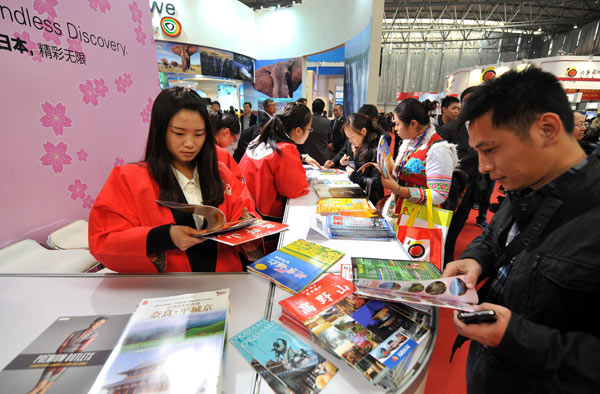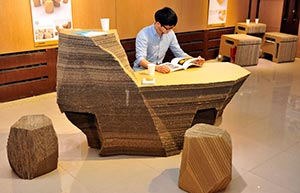

 |
|
Visitors learn about Japanese destinations and tour packages at a tourism fair in Kunming, Yunnan province, on Thursday. Despite political tension, China and Japan have begun to see an uptick in bilateral trade and non-governmental connections. Lin Yiguang / Xinhua |
Despite the stalemate in political ties between China and Japan, economic relations of the two Asian economies have improved this year compared with the second half of last year, with a pickup in bilateral trade and increased business and non-governmental connections, experts said.
"The economic ties between China and Japan are improving compared with the second half of last year. Business connections between the two sides are strengthening with increased entrepreneurial and people-to-people communications," said Li Guanghui, vice-president of the Chinese Academy of International Trade and Economic Cooperation, a government think tank.
"Mutual demand for each other's markets are the basis and the two economies share high interdependency. Businesses from the two countries have strong willingness for cooperation," Li said after a recent visit to Japan with a business delegation.
He added that, on the whole, the current situation of China-Japan economic relations is "better than last year", especially in two-way trade, which sharply contracted after Japan's "purchase" of the Diaoyu Islands led to territorial disputes between the two Asian powers.
"The pickup of China-Japan trade is expected to extend into the fourth quarter of this year, while the whole year will see bilateral trade post a decline," Li said.
Yao Haitian, a researcher from the Institute of Japanese Studies at the Chinese Academy of Social Sciences, echoed that sentiment. "China-Japan economic ties are now at a phase of gradually getting away from the bottom," he said.
Yao said that bilateral trade is likely to ease the declining pace in the fourth quarter of this year, mainly owing to the sharply contracted trade figures in the same period of last year following the territorial rows.
"The impact from strained ties keeps hurting bilateral trade. While some demand recovered in the two markets, other demand will never regain in the Chinese market because some domestic customers refuse Japanese brands," Yao said.
China is growing into the world's largest consumer market and the world's largest trader. The country's imports in the next five years are expected to total $10 trillion.
In the January-September period of this year, Japan was China's fifth-largest trade partner. Bilateral trade reached $229.08 billion, down 7.9 percent from a year earlier, while China's overall trade rose 7.7 percent.
China's exports to Japan went down 2.8 percent year-on-year in the same period to $109.31 billion, while its imports dropped 12.1 percent to $119.77 billion, according to the General Administration of Customs.
Zheng Yuesheng, a spokesman for the customs agency, said on Oct 12 that China-Japan trade "showed signs of improvement since the second half of this year" and the monthly trade value narrowed the declining trend for three straight months since July.
Meanwhile, China's exports to Japan in September rose 1.5 percent year-on-year, which ended the 14-month decline since July 2012.
Data from Japan's Ministry of Finance showed on Oct 21 that Japan's exports to China in September, Japan's largest trading partner, climbed 11.4 percent from a year earlier after increasing 15.8 percent in August, while its shipments to the United States rose 18.8 percent following a 20.6 percent gain in the previous month. Export growth to the European Union eased to 14.3 percent from 18 percent.
Despite the weakened yen, Japan's merchandise trade balance showed a deficit of 932.1 billion yen ($9.5 billion), marking a record 15th consecutive month in the trade deficit. Japan's exports in September increased 11.5 percent from a year earlier, the weakest pace in three months, while imports expanded 16.5 percent, Japan's Finance Ministry said in a preliminary report.
Zhang Jianping, a researcher from the Institute for International Economic Research of the National Development and Reform Commission, added that the weak yen helped to boost Japan's exports in the short term, but the effects of Japan's Prime Minister Shinzo Abe's stimulus measures are ebbing in the medium and long term.
 World's first 1-liter car debuts in Beijing
World's first 1-liter car debuts in Beijing
 Paper-made furniture lights up art show
Paper-made furniture lights up art show
 Robots kick off football match in Hefei
Robots kick off football match in Hefei
 Aerobatic team prepare for Aviation Convention
Aerobatic team prepare for Aviation Convention
 China Suzhou Electronic Manufacturer Exposition kicks off
China Suzhou Electronic Manufacturer Exposition kicks off
 'Squid beauty' and her profitable BBQ store
'Squid beauty' and her profitable BBQ store
 A day in the life of a car model
A day in the life of a car model
 Vintage cars gather in downtown Beijing
Vintage cars gather in downtown Beijing